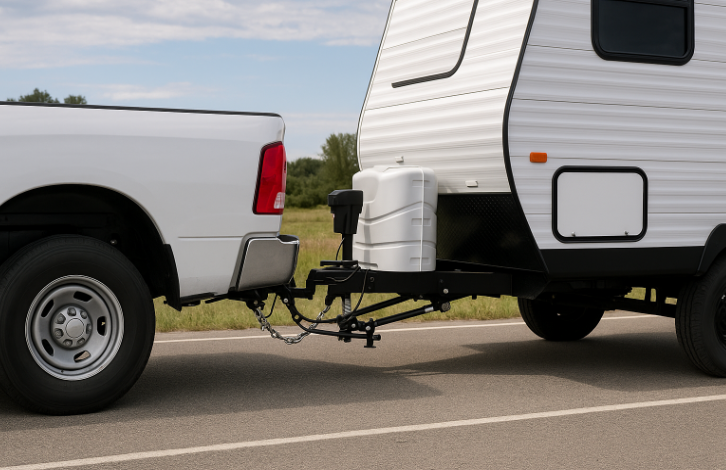Top Solutions to Improve Your Trailer’s On-Road Performance

Enhance Trailer Towing for Better Safety and Comfort
Towing a trailer safely and comfortably isn’t just about having a strong vehicle. It’s about ensuring your trailer performs well on the road under various conditions. Whether you’re hauling a camper, a boat, or a cargo trailer, poor on-road performance can lead to sway, instability, or even accidents. Improving your trailer’s road behavior involves more than just hitching up it requires the right equipment, load balancing, and towing practices.
In this guide, we’ll explore the top solutions to improve your trailer’s on-road performance, covering key components and expert tips to help you tow smarter and safer.
The Importance of Smart Towing Solutions
To get the best towing experience, you need reliable towing solutions tailored to your load type, vehicle size, and travel conditions. These solutions are more than accessories they’re essential for better control, safer driving, and less wear on your vehicle. Upgrading to specialized towing gear, maintaining your trailer regularly, and understanding load management are critical steps toward optimizing your trailer’s road behavior.
See also: How Technology Is Making Gold Loans Safer, Faster, and More Accessible Online
1. Use a Weight Distribution System
One of the most effective ways to improve towing safety and stability is by using a Weight Distribution System. When heavy tongue weight causes the rear of the tow vehicle to sag, it can lead to poor steering control, reduced braking efficiency, and increased sway.
A weight distribution hitch evenly spreads the load across the axles of both the trailer and the towing vehicle. This not only enhances stability but also allows for better handling and reduced driver fatigue. Many modern systems also integrate sway control to keep your trailer steady during crosswinds or sudden maneuvers.
2. Ensure Proper Trailer Weight Balancing
Uneven weight distribution inside the trailer is one of the leading causes of poor handling. Trailer Weight Balancing involves placing cargo so that approximately 60% of the weight is in front of the axle and 40% behind. This helps maintain downward force on the hitch, preventing sway and bounce.
Use a trailer tongue weight scale to check your load setup and reposition heavy items as needed. Keep the center of gravity low and centered to improve turning and braking control.
3. Choose the Right Tires and Maintain Proper Pressure
Tires are critical to both the performance and safety of your trailer. Always select tires rated specifically for trailer use (ST-rated) and ensure they match the load capacity you need.
Low tire pressure can lead to blowouts, poor traction, and excessive sway. Check tire pressure before every trip and inspect for signs of uneven wear or cracking. Don’t forget to also inspect your tow vehicle’s tires, as they bear extra stress when towing.
4. Upgrade to Trailer Brakes with Smart Control Systems
While smaller trailers may not require brakes, any trailer over 1,500 lbs should have them for safety. Electric brakes with proportional brake controllers offer the best stopping performance. These systems match the braking force of the trailer with the tow vehicle, creating a smooth towing experience even during sudden stops.
Some modern brake controllers offer real-time adjustments, presets for different trailer types, and Bluetooth connectivity for remote monitoring.
5. Invest in a Stable Towing Solution
A stable towing solution is more than a sturdy hitch — it’s about using components designed to reduce movement, absorb shock, and limit sway. Consider anti-sway bars, dual-cam sway control, or combination hitches that offer both load distribution and sway resistance.
These tools make your towing setup feel more responsive, particularly during turns, stops, or in windy conditions. Brands like Andersen Hitches offer innovative hitch systems that combine weight distribution with built-in anti-sway functionality, helping drivers achieve smoother, safer rides even under heavy loads.
6. Perform Regular Maintenance on Trailer Components
Routine maintenance is key to extending the life of your trailer and improving its road behavior. Check these areas regularly:
- Brakes and bearings: Repack bearings and inspect brakes at least once a year.
- Lights and wiring: Ensure all signals, brake lights, and connectors are functioning.
- Suspension and axles: Look for rust, cracks, or worn-out bushings.
Keeping these components in top condition reduces the chance of breakdowns and ensures a safer trip every time.
Conclusion
Improving your trailer’s on-road performance doesn’t have to be complicated—it’s about making the right upgrades and maintaining the right balance. From installing a reliable weight distribution system to ensuring proper trailer weight balancing and brake functionality, each component plays a role in delivering a stable and controlled towing experience. With smart planning and quality gear—such as sway-control hitches from trusted brands—you’ll enjoy peace of mind and safety whether you’re heading across town or across the country. Tow with confidence, and make every mile smooth, secure, and stress-free.
FAQs
1. What’s the ideal tongue weight for a trailer?
Ideally, tongue weight should be 10–15% of the trailer’s total loaded weight. This helps maintain control and minimize trailer sway.
2. Do I need a weight distribution hitch for a small trailer?
Not always, but if your trailer causes the rear of your vehicle to sag or you notice sway during towing, a weight distribution hitch can significantly improve handling and safety.




